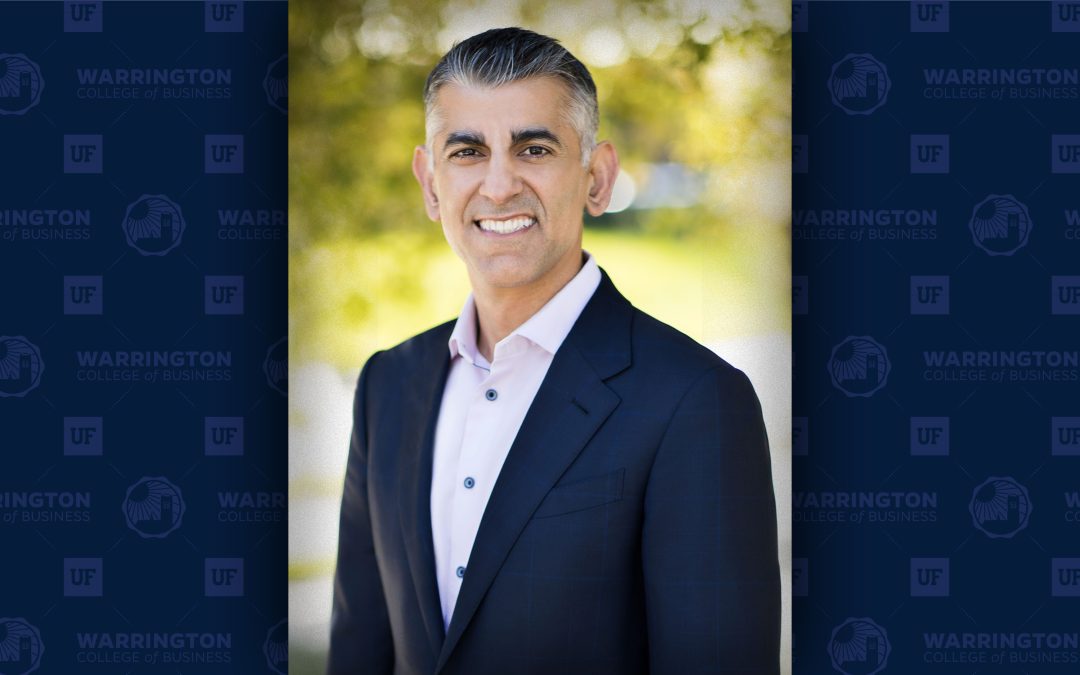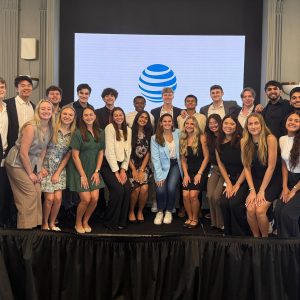How to navigate the evolving cybersecurity landscape
Sumit Dhawan (MBA ’03) leverages his diverse experience in technology and business as Proofpoint’s CEO.
From technical expert to business leader
Sumit Dhawan (MBA ’03) is well versed in solving the complex, technical challenges that arise within computing. He has bachelor’s and master’s degrees in computer science, which prepared him well for a role as an engineer, but Dhawan recognized that he needed additional skills if he wanted to progress in his career.
Dhawan wanted to further develop his ability to think strategically, so he decided to expand his education with an MBA. The University of Florida’s flexible Online MBA program, which is consistently ranked in the top five nationally, offered Dhawan two key benefits that drove him to enroll in the program: managing an intense workload and focusing on the power of effective management within an organization.
As someone who didn’t have a business background, though, Dhawan found the workload to be a bit daunting.
“The main thing that stands out to me about the MBA program is the workload,” he recalls. “At first, I felt I didn’t have much context for the business cases, but working through them enhanced my analytical and communication skills. Those experiences also helped me develop a habit of reading and writing regularly.”
His time in the MBA program, as well as the early stages of his career, introduced Dhawan to an important aspect of management that would ultimately form the foundation of his career—gaining broad knowledge across all areas of business.
“Through mentors and coaches, I learned that to be good at management I needed to have a good understanding of multiple key functions, and I needed to spend time in those functions,” he says.
Through self-created opportunities, Dhawan spent several years of his career working in areas such as product development, corporate development, sales, marketing, market strategy, and beyond. These foundational years were just what he needed to transition into managerial roles before moving into the C-suite.
“I’m glad that I got the advice to actually spend time doing different things early on in my career,” he says. “That combination [with the MBA] gave me the confidence and ability I needed to learn to ask the right questions and have empathy and support for the team when they need it.”
Securing the human element
Today, Dhawan leads as the CEO of Proofpoint, a cybersecurity solutions company. As someone who has focused on technology throughout his career, Dhawan isn’t deterred by the pace of change that comes with working in cybersecurity. In fact, he thrives on it.
“The pace of change [in the tech industry] is only for those that want and relish it,” he says. “People joining this industry have to balance bold intentions, creating dreams for clients, and helping them achieve those dreams via execution at scale.”
Over the past 10 to 15 years, cybersecurity has evolved beyond protecting individual company computers and networks, Dhawan explains. Today, because people can work from just about anywhere, the way employees connect to their corporate systems and engage with individuals they do business with are completely different.
“If I’m a threat actor, I don’t care about attacking just the [company] networks or devices,” he says. “Now, I can attack individuals and find vulnerabilities everywhere, and that makes employees a source of vulnerability for whomever they work for.”
In fact, 95% of cybersecurity issues can be traced to human error. That’s why Proofpoint is focused on the human element in its cybersecurity solutions.
To stay ahead of threat actors, the company continuously aims to build its intelligence on the threat landscape, Dhawan says. For Proofpoint that means relying on experts who have a deep understanding of the new technologies being used by threat actors, as well as those who can build defense systems.
AI’s double edge: New threats and opportunities in cybersecurity
The most pressing industry concern for Dhawan is the impact of AI. In an industry that is constantly evolving, AI poses a new risk on two fronts, according to Dhawan.
Where there were once natural barriers to certain kinds of cyberattacks, the power and accessibility of AI have made it easier for threat actors to execute. Where it once would have taken threat actors time to write communications to entice people to give access to their passwords or issue incorrect payments, AI can do so almost instantly and without language errors, Dhawan describes.
“Historically, the language barrier has protected some markets: it’s tough to produce a convincing phishing email in Japanese if you don’t speak the language,” he says. “But now, that language barrier has disappeared because of AI.”
The popularity of AI also means that more companies are going to invest in their own AI products, Dhawan says, leading to more opportunities for threat actors to access data they previously could not get their hands on before through the new AI tools.
Building success through customer and team engagement
The use of AI in cybersecurity is still in its infancy, and that’s one of the reasons Dhawan is excited about his work every day.
“The game is never over,” he says.
As CEO, Dhawan is constantly assessing how the world will change so that he and his team can develop a strategy for the business. Dhawan’s time is heavily focused on strategy, so hiring leaders who can run what he calls the “meat and potatoes” of the business without much of his involvement is critical to the daily operations of the company.
People, whether members of the team or customers, play a significant role in shaping Dhawan’s plans for Proofpoint.
“When you engage with [the team and customers], that fuels your ability to set strategy,” he says.
The continuous journey of leadership and learning
Just like cybersecurity, the work of a leader is never done, Dhawan says. In his experience, leadership is both complex and lonely, but it must be done to set the tone for the company’s work—and to inspire and build the company’s culture.
“You have to be comfortable seeking inspiration from sources that you find yourself, because it’s not going to be given to you,” he says. “You have to set the pace for yourself.”
For Dhawan that means constantly learning, which he recommends any young professional do as they begin their career.
“[Cybersecurity] isn’t a field that you can expect to grasp without continually investing your time and staying on top of technology trends,” he says.
Beyond the boardroom
To stay at the top of his game, Dhawan spends much of his free time reading, with a focus on nonfiction works ranging from history to politics to business.
But it’s not all business all the time for Dhawan. After picking up golf during the pandemic, he makes time to play regularly with his wife so they can get outside to chat about their college-age son and have some competitive fun.
Dhawan is just as invested in watching sports as he is playing them. A few days a week between October and April, he gets to indulge in one of his favorite pastimes, watching his beloved Golden State Warriors during the NBA season.
“If I have to miss a game, I will record it and stay away from social media for a few days until I can watch it,” he jokes.




